September isn’t just the start of autumn—it’s also packed with financial updates that could impact your household budget. From energy price changes to expanded childcare support, these changes could either tighten or ease your money situation.
Whether you’re a parent, a homeowner, or just trying to keep your energy bills in check, there are seven important dates in September that you’ll want to mark on your calendar. Let’s break them down so you don’t miss out.
Table of Contents
Childcare
Date: September 1
From September 1, working parents of nine-month-olds will become eligible for 30 hours of free childcare per week. This doubles the current entitlement of 15 hours.
To qualify, each parent must earn at least the equivalent of 16 hours per week at minimum wage, but less than £100,000 annually. All parents of three- and four-year-olds already get 15 hours free regardless of work status, and working parents can access the full 30 hours.
If you meet the criteria, you can apply through the government’s childcare website and need to reconfirm your details every three months.
Statements
Date: September 1
First Direct customers will stop receiving paper statements for savings accounts from this date. The switch to digital is automatic, but customers who prefer paper can opt back in.
Just log into the First Direct app or website, go to ‘my details’, then ‘statement preferences’, and select paper statements if needed.
Closures
Date: September 1
NatWest is closing 26 bank branches starting September 1. Halifax is also shutting 13, and Lloyds will close one branch. This is part of an ongoing trend toward digital banking and fewer in-person locations.
If your branch is affected, make sure to register for online banking services or find your nearest alternative branch.
Fuel
Date: September 15
The Winter Fuel Payment—worth up to £300—is usually paid automatically to those eligible. However, if you think you qualify but don’t receive it automatically, you’ll need to make a claim.
Postal applications open on September 15, while phone applications will begin on October 15. Eligibility depends on your age during the qualifying week (usually the third week of September).
Inflation
Date: September 17
The Office for National Statistics (ONS) will release the latest inflation figures on this date. This number reflects how much prices are rising, and it directly affects decisions on benefits, pensions, and even wages.
The last reported inflation rate was 3.8 percent. While it’s down from the 2022 peak of 11.1 percent, it still puts pressure on household budgets.
Interest
Date: September 18
The Bank of England will announce its latest decision on interest rates. The base rate currently stands at 4%, after a reduction earlier in August.
This rate affects everything from mortgages and loans to credit card interest. Any change—up or down—could have an impact on your monthly payments or savings returns.
Reading
Date: September 30
Make sure you take your energy meter reading around this date. The new Ofgem price cap will come into effect on October 1, so this reading ensures you aren’t charged higher rates for energy used before the change.
Right now, the price cap is £1,720 per year for an average direct debit household. Forecasts suggest it may rise slightly to £1,744. By submitting a meter reading before October begins, you lock in the current rate for the energy you’ve already used.
So, whether it’s free childcare, your energy bills, or your bank’s local presence, these seven dates could all play a role in shaping your September budget. Staying on top of them can help you avoid unnecessary costs—and maybe even save a few pounds along the way.

